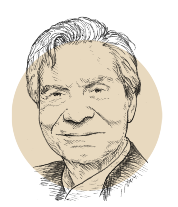Our history books do not mention it, and no one celebrates it. This is a mistake. On this day, the representatives of the French nation, the nobility, the clergy, and the third estate, summoned to Versailles by Louis XVI, decided on the nature of the regime that would henceforth govern France. As in the United States, the principle of a constitution was settled, but a constitution by itself does not make a democracy. A democracy becomes real only when voters can decide between different policies. How were they to choose?
On September 11, 1789, two weeks after the adoption of the Declaration of the Rights of Man and of the Citizen, the nation’s representatives had to decide between two conceptions of power: the absolute power of the king, such as Europe had always known it; or a power limited by laws and a constitution. The National Constituent Assembly decided. To facilitate the counting of votes on the question of the royal veto, the representatives in favor of an absolute monarchy placed themselves to the right of the president of the session, while those inclined towards constitutional monarchy moved to the left. The left carried the question by 673 votes to 325, with 11 abstentions. Thus, in a somewhat haphazard way, these notions of right and left became established in all the world’s democracies and in all political debates.
The contents varied with circumstances, local cultures, intellectual passions, and social tensions, but the principles remained immutable – no doubt somehow inscribed in our psychology, our personal experience, our family tradition, and our education. On the right we tend to find conservatives, and on the left, progressives. The right is based on individual initiative; the left prefers social justice. The right expects the state to maintain a stable and predictable order; the left expects the state to produce equity between individuals and between communities. More examples might be listed, but anyone can extend the comparison. It has been found to be statistically stable in all democracies: Elections are always contested between the right and the left, with a few points between them. And yet, it seems today, in the wake of the French presidential election, that the cycle started on September 11, 1789, came to an end on April 24, 2022. Here is why.
Is Emmanuel Macron on the right or the left? He has refused this distinction, as have his voters, coming as they do from both the right and the left. Nor does his defeated adversary, Marine Le Pen, define herself according to this classical dividing line; she prefers to call herself a partisan of sovereignty, even a nationalist, while her adversaries regard her as a populist. What distinction should we then turn to? If we ask what Macron proposes and embodies, the answer might be a society open to the cultures of the world, to the European Union, and to technical and societal innovation. As for Marine Le Pen, she prefers an eternal, immutable France, reluctant on the question of immigration, and on cultures, norms, and products from elsewhere. There is something of Donald Trump in Marine Le Pen; in fact, she embraces the comparison. She also sympathizes with the populism of Russian, Polish, and Hungarian leaders. She has tried to counter Macron’s “elitism” with her idea of “the people.” Hence the appellation “populist,” as if the people were distinct from those who represent them. Here again, we see Trumpism.
The preference for direct democracy – referenda, for example – as opposed to representative democracy – flows from this idealization of the people, as if the people in themselves were more authentic than their representatives. History in no way confirms this hypothesis, but myths in politics have their own existence. In this populist age, Donald Trump appears to be not simply an American aberration, but the precursor to a new phase of democracy. If 41.5% of the French voted for Marine Le Pen, that means that they no longer recognize themselves in the choice between right and left, but embrace a new division of society: the partisans of a society that is “closed” (to others) versus a society that is “open” (to all).
How might this rise of populism be explained? In fact, our societies remain divided down the middle, no longer by philosophical choices, but by each person’s social, economic, and educational status. Marine Le Pen’s voters, like those of Donald Trump, Boris Johnson, and Viktor Orbán, are people of modest circumstances and attached above all to their national, cultural, and ethnic identity. The idea of a wide-open society does not tempt them, for in it they see a loss of this identity. Identity is their heritage, owing to the lack, in many cases, of the technical and civic education that would no doubt allow them to overcome their distrust of change and their tendency to fear and demonize “the other.”
If this is indeed the basis of populism, its roots go deep, and no critical argument will make it disappear. Looking at the big picture, a paradox emerges: Yesterday’s right and left are now in the same camp, since both are based on reason and derive from the Enlightenment. Both believe that reason leads to progress. Populists, on the other hand, cling to their passion, the passion for the nation, or even for race. Going forward we will have to continue democracy on this new foundation, the opposition of reason/passion or open society/closed society. This will not be easy, but let us learn from each other and avoid resorting to invective in order to continue living together. This would be good.
Editorial published in the June 2022 issue of France-Amérique. Subscribe to the magazine.












